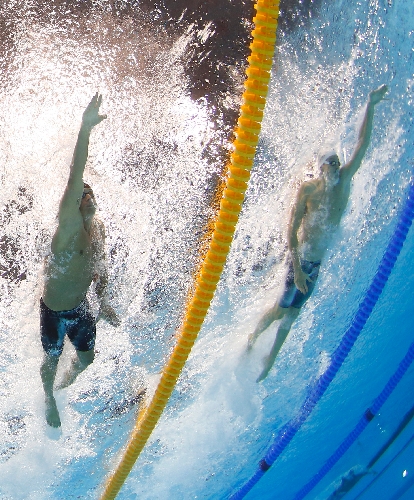France avenges 2008 loss to U.S., wins men’s freestyle relay

LONDON – Payback. This time, it was France chasing down the United States – and Ryan Lochte, no less – to win another riveting relay at the Olympics.
With Michael Phelps looking much stronger than he did the night before, the Americans built a commanding lead over the first three legs of the 400-meter freestyle relay Sunday and never had to worry about the defending world champions from Australia.
When Lochte hit the water on the anchor leg, he was a half-body length ahead of the field and looking to add another gold to his dominating victory Saturday in the 400 individual medley.
Not so fast.
Or, not fast enough.
Yannick Agnel, playing the chaser role that Jason Lezak did for the Americans four years ago in this same event, was right on Lochte’s shoulder as they made the turn. With about 25 meters to go, they were stroke for stroke.
But Lochte, who had already competed in 1,200 meters of racing over the first two days, simply didn’t have enough left to hold off the towering, 20-year-old Frenchman, one of the sport’s rising stars.
"I gave everything in the last 50 until he cracked," Agnel said. "In the last 10 meters, I saw that he was really cracking."
Agnel touched in 3 minutes, 9.93 seconds, having gone exactly one second faster than Lochte over the last 100 meters. The Americans dropped to silver in 3:10.38, while Australia – the favorite – didn’t even get a medal. Russia took the bronze in 3:11.41, edging the team from Down Under by 0.22.
"We knew the Australians would be very strong, but they were very nervous, perhaps like us in 2008," said Clement Lefert, who swam the third leg for the French. "We were very relaxed, like the Americans in 2008.
"And four years later," he added, "we got our revenge."
Phelps settled for his 17th career medal – and first silver – to move a step closer to becoming the most decorated Olympian ever.
But silver was a bitter disappointment for the Americans, who know how the French felt four years ago.
France had the lead in Beijing and its best sprinter, Alain Bernard, going out on the final leg. But Lezak swam the fastest relay leg in history, drafting Bernard along the lane line and beating him by a scant 0.08 seconds to keep Phelps on track for his record eight gold medals.
That was one of the greatest races in Olympic history.
This one wasn’t too shabby, either.
"I was just really excited, and I think I overswam the first 50 and it hurt me for the last 50," Lochte said. "But we were able to get a medal, so I guess that’s good."
Phelps put up the fastest time among the Americans, covering the second 100 in 47.15 and showing he still intends to be a force at these games after his disappointing start. Nathan Adrian swam the leadoff leg in 47.89, going out faster than Australian star James Magnussen to give the U.S. an early lead. Cullen Jones was solid, too, in the third spot (47.60).
Lochte was handed a lead of more than a half-second, but he couldn’t hold it. Agnel covered the final leg in 46.74 – not quite as spectacular as Lezak’s 46.06 at Beijing – while Lochte labored home in 47.74.
"It’s tough," Phelps said. "We’d like to be on top, but Yannick has been swimming well all year and those guys put together a great relay. We tried to get ourselves into as much open water as we could. We had four great guys to get up there and swam as fast as we could. We were the ones that the coaches thought were going to have the best shot. We went out there and raced. That’s all you can ask."
The U.S. coaches will surely come under scrutiny for going with Lochte, who had little experience in the 100 free and had never competed on this relay at the Olympics. But, coming off his dominant showing the first night, it’s hard to argue about going with a swimmer who appeared to have the hottest hand of all.
"The 100 free, I don’t really swim it. I haven’t swum it in a long time," Lochte said. "You would think doing distance events, I wouldn’t get tired. But sprinting takes a lot out of you."
Two more world records fell earlier in the evening.
American Dana Vollmer took down the mark in the 100 butterfly, then Cameron van der Burgh of South Africa broke another in the 100 breaststroke – denying Japan’s Kosuke Kitajima, who finished fifth, a third straight Olympic gold.
Vollmer was third at the turn but powered home for a time of 55.98, beating the record of 56.06 set by Sweden’s Sarah Sjostrom at the 2009 world championships. Not bad for someone whose career was sidetracked by injuries and illness.
"I kept telling myself that my strength is my second 50," Vollmer said. "I kept really calm."
She dropped back her head when she saw the time, then broke into a smile, slapped the water and pumped her fists.
"I’m on top of the world right now," said Vollmer, who qualified for Athens as a 16-year-old but was a disappointment in 2008. "I still know I can go faster."
France’s Camille Muffat won a riveting 400 freestyle duel with American Allison Schmitt, the two virtually even the entire way. Muffat held on to win in an Olympic-record time of 4:01.45, while Schmitt (4:01.77) settled for silver – a sign of things to come.
Britain’s Rebecca Adlington brought out the biggest cheer when she touched third, the home country’s first swimming medal of the games.